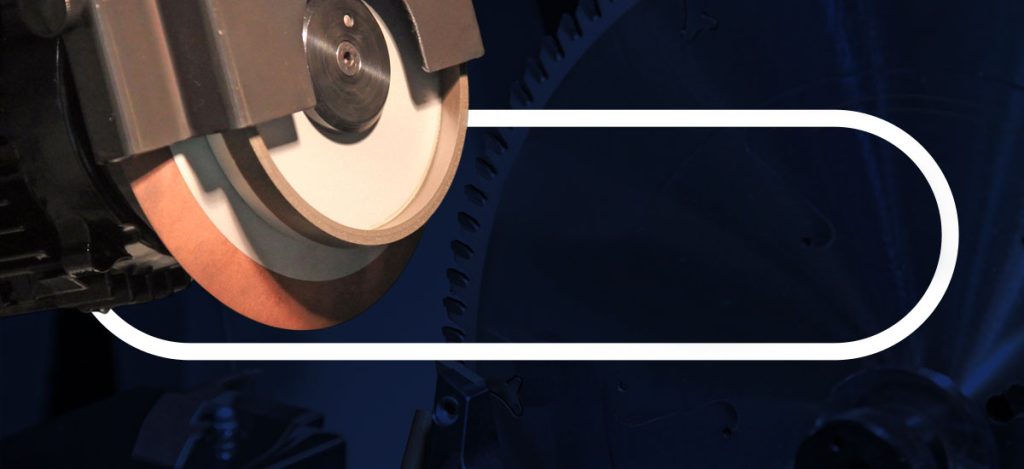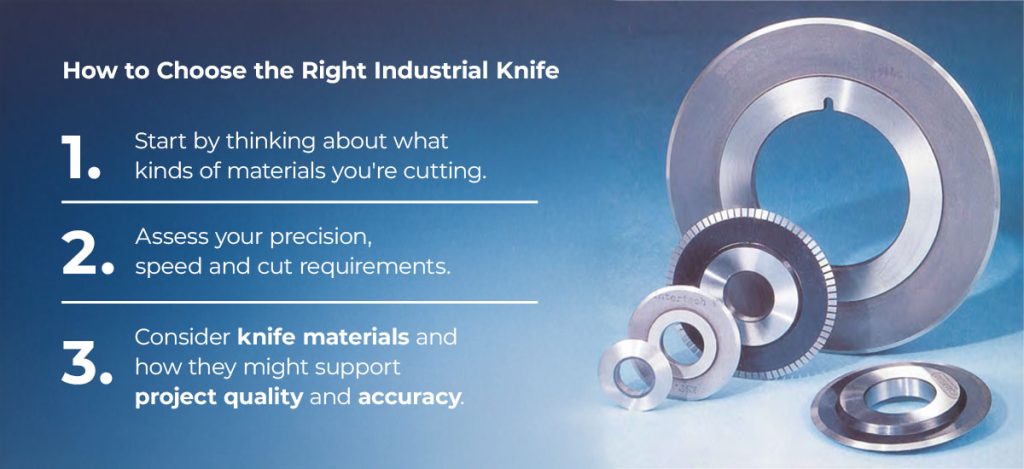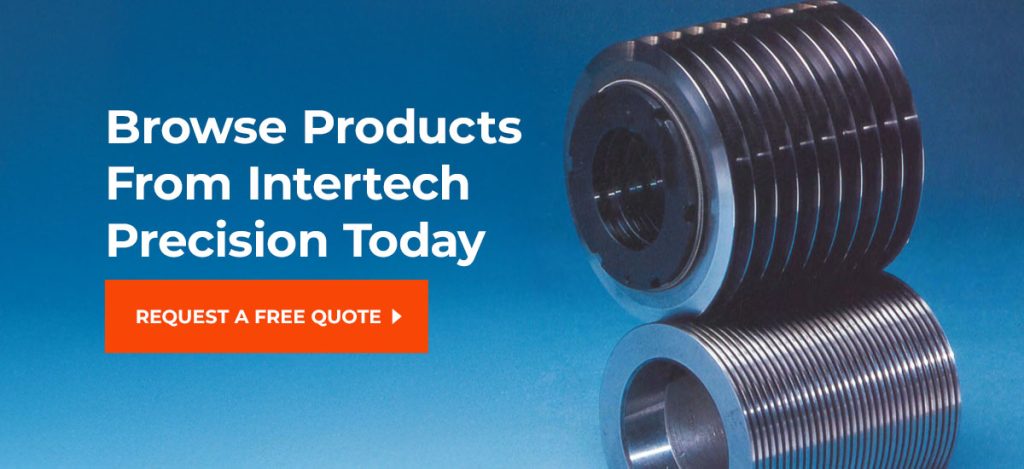
Industrial knives are crucial tools for slitting, shearing and a variety of similar cutting applications. There are diverse types of industrial knives to cut different kinds of materials, and they can be used manually or in automatic machinery.
The right knife can make a considerable difference in project quality and success. Learn more about selecting appropriate knives for industrial projects below.
What Are the Different Types of Knives for Industrial Projects?
You need different types of knives depending on what you’re cutting. These tools are designed to perform reliably in demanding conditions, such as high-speed production lines, extreme temperatures and corrosive environments, and they’re most useful when you use them as intended.
Explore some of the different types of cutting knives:
- Circular knives: These knives can be used in automated machinery, featuring a circular blade that rotates during cutting. A circular knife is best for slitting and converting operations involving cutting film, foils, paper and textiles at high speeds.
- Cutoff knives: If you need to cut materials at specific lengths or separate materials for processing, cutoff knives are an ideal choice. These knives are often used in the packaging, converting and manufacturing industries and can be custom-designed for specific applications.
- Fiberglass knives: When working with fiberglass sheets, panels and composite materials, fiberglass knives provide clean cuts without causing excessive damage or fraying. This type of cutting knife is composed of carbide or a similar hard material for wear resistance, with different grades of carbide offering different wear resistance levels.
- Rotary knives: These circular blades are found in rotary cutting machines, particularly for cutting metal coils and sheets and thinner gauge materials. Use them for cutting straight or curved cuts.
- Slitter knives: Choose a slitter blade for slitting, scoring and trimming materials. These cutting tools can be either circular or rotary and are often made from carbide, high-carbon steel or tool steel, including D2, M2 or CPM 10V steel ratings.
- Straight knives: A straight knife is best for general-purpose cutting, thanks to its simple design. It has a straight blade, perfect for cutting materials like leather and foam, and is easy to sharpen.
How to Select the Best Industrial Cutting Tools for Your Application
Across different industries, you’ll find many uses for industrial knives. Whether you’re looking to trim excess material, cut materials into specific thicknesses or shear sheet metal, you can find a cutting tool that meets your needs. Learn how to choose the right industrial knife based on a few important factors:

1. Materials
Start by thinking about what kinds of materials you’re cutting. Are you working with a softer material like foam? In that case, a straight knife with a serrated or scalloped blade could be effective. Cutting a harder material, such as steel or copper, would require an option like a rotary or slitter knife, as they’re made from durable carbide or steel.
In addition to the material type, consider the thickness and abrasiveness. Generally, thicker materials require more robust blades to achieve clean cuts, and the blade material’s microstructure, such as its grain size and hardness, can point you in the right direction. If you’re cutting abrasive materials, think about the knife’s durability, as continuous exposure to abrasion can quickly wear down blades that aren’t as wear-resistant.
2. Cutting Requirements
Assess your precision, speed and cut requirements. For projects requiring high levels of precision, choose a knife with a sharp edge and plenty of stability to create the desired precision control. If speed is more of a priority, you’ll want a knife that can retain its sharpness and stability over time so you can maintain that level of speed.
Additionally, the desired material cut will make a difference in your knife selection, such as whether you’re looking to achieve a smooth edge or a clean cut. Further, cutting angles and heat generation are essential considerations. For example, excessive heat can reduce blade hardness and speed up wear in certain environments.
3. Knife Characteristics
Consider knife materials and how they might support project quality and accuracy — you want your cutting tool to be durable, wear-resistant and appropriate for the materials you’re cutting. The Rockwell hardness C scale (HRC) can help in your steel knife selection. Generally, the higher the number on the scale, the harder the steel.
A few of the most common knife materials include:
- Carbide: Hard and wear-resistant, ideal for cutting abrasive materials
- Ceramic: Hard and chemically inert, but can chip due to brittleness
- High-carbon steel: Hard and sharp, but not corrosion-resistant
- Stainless steel: Corrosion-resistant, but less hard than other options
- Tool steel: Hard, tough and wear-resistant
Note that blade coatings can boost the performance of base knife materials. For example, to reduce friction, think about coating your blades with titanium nitride or diamond-like carbon. Specifically, titanium nitride can boost surface hardness.
Prioritizing safety is also important. The right cutting tool will come with modern safety features to protect your team. Examples include blade guards and locking mechanisms to prevent accidents. No matter which kind of cutting tool you choose, be sure to train employees on proper safety practices, too.
Industrial Knives Offered by Intertech Precision
At Intertech Precision, we offer a range of industrial cutting tools to meet your pressing slitting and converting needs. With the appropriate blades and knives, your team can prioritize efficiency, productivity and precision in every cut. These tools are also scalable, allowing you to expand your cutting operations as your company grows.
- Circular knives and blades: Investing in our range of circular knives and blades gives you access to sharp, precise tool steel in a variety of popular alloys, such as 52100 and D2. Choose from different bevels and angles to achieve the exact cut you need. Some of the score and crush cut knife brands we stock include Appleton, Coretech and Paco, among others.
- Shear knives and blades: A shear cutting system is incredibly effective for cutting thicker materials. In our array of products, you can find shear knives and blades that hold up amid intense slitting industry conditions. These cutting tools are go-to options for their ease of use and adaptability.
If you require a specialized cutting tool for your specific application, our team can also create custom slitting blade designs to meet your needs.
Browse Products From Intertech Precision Today
By understanding the different kinds of cutting tools and certain selection considerations, you’re one step closer to improving your cutting operations. All that’s left is finding a knowledgeable tool supplier.
Intertech Precision is your partner in industrial cutting knives and systems, offering over 70 years of experience in the industry. No matter your slitting project needs, you can find the right tools in our inventory. Plus, our expert team can assist in knife sharpening, honing, lapping and other services, so you can keep your knives and blades in top condition.
Curious about how we can assist your company? Browse our cutting products to see what we have to offer. If you’re ready to get started, request a free quote today, and our team will be in touch.

